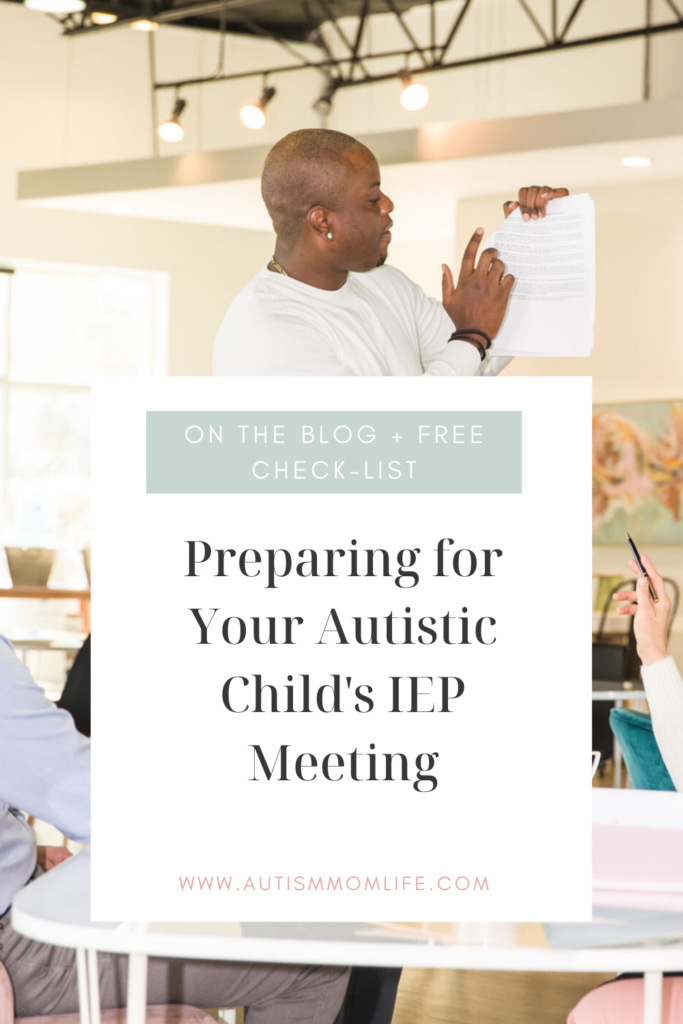The very mention of the word IEP can have you ready to pack your bags, ready to book the next flight to the Bahamas (oh wait— that’s just me?). Hear me out, mama. An IEP meeting doesn’t have to be this big scary big ordeal that makes us want to hide under the covers until it’s over.
Here are some strategies to help you prepare for an IEP meeting:
Prior to the IEP meeting:
Be prepared. Prior to the actual IEP date make sure to spend time reading over the actual IEP.
-
- Grab a highlighter, start highlighting key areas that you would like to discuss during an IEP meeting. Is there anything that needs clarification? Is the language confusing?
-
- Sometimes, we form this belief that if we simply ask for clarity, people wouldn’t take us seriously. Instead, asking for clarity shows the teacher/therapist that you’re involved in the goal-setting phase, and want to work with them to help your child make progress in a particular goal.
-
- Do try to ask clarifying questions prior to the meeting if possible.
-
-
- It’s okay to not understand an IEP, but it’s vital that you seek answers to help you better understand the proposed goals.
-
Ask someone to come with you. Ideally, this would be either a caregiver or an outside therapist. Someone who is involved in working with your child to provide a well-rounded and balanced understanding of your child’s abilities outside of the school setting.
Video is king. If there are any areas that may call a skill in question: RECORD it. For us, this could mean recording our son tying his shoelaces, recording our son saying “yeah,” writing his name, etc. Whatever skill is called to question (and hasn’t been witnessed in the school setting), you’ll want to make sure you provide documentation of this acquired skill.
On the day of the IEP meeting:
If at all possible: get there early. I usually sit in my car and will say a prayer, asking for God’s wisdom, discernment, and favor. If you’re not of faith, or even if you are, speaking affirmations over yourself really helps. I am my child’s best teacher and am confident in my ability to advocate for what he (or she) needs. I have everything I need to lead and guide this conversation. I am open to being pleasantly suprised by the team.
-
- Release tension. Do simple breathing exercises, if you need more guidance, the Calm app is great for this. Breathe in deeply and release stress and tension. Do this until you feel you’re able to let go of some of the jitters.
-
- If you find you’re still feeling anxious, speak affirmations aloud. It’ll help affirm your role as the parent and the expert on your child. Oftentimes, people will walk right into an IEP meeting, and allow the “experts” to take control of the meeting. DO NOT do this, friend! You’re the expert on your child.
Go in there with the belief that your child’s teachers & therapists want to help them. Most people go into their respective fields with a heart to better the lives of our special needs children. Even if you don’t see eye to eye with your child’s teacher, this shift in perspective is everything.
-
- If you go in there with a firm belief that they don’t want to help you, don’t want to work with you, or have no interest in your child, it’s going to show on your face, your tone which will oftentimes, lead to unnecessary tension in the meeting. This is crucial friends. You’re going in there to advocate for your child, but you want to partner with your child’s teachers and therapists.
-
- There is nothing worse than walking into a meeting and feeling like you have to defend yourself. No one wants to be a part of that team. By shifting your beliefs to serve you, you’ll be better equipped to serve your child.

Preparing for An IEP Meeting: Use Collaborative Language
Languages that often leads to great collaboration: “how can I team up with you in this?” “how can we work together to make this happen?” “Thank you for sharing your observation of Jacob’s behavior at recess. We had a similar encounter while we were at the Y, and Jacob seemed to respond positively when we (fill in the blank).” Exp. provided him with head pressure, gave him his headphones without requesting anything of him until his body was ready to get up.
-
- Give a genuine smile. Research shows that the very act of smiling will help lessen stress and put you in a better mood.
-
- Thank everyone & be sincere. This simple act of gratitude sets the tone for a positive meeting ahead and can make you feel happier. One of the benefits of thanking everyone at the start of the meeting is that you exert authority over the meeting.
-
- I always follow this by asking if there’s anyone present at this meeting who has to leave early. This is your child’s IEP meeting. You need to own this and take control of it. So, own it. Ask politely if there’s anyone who needs to leave early, and asks them to speak first.
Always greet someone by their first name. I avoid using last names/no names at all cost. It sounds more formal, and what you’re trying to do is decrease tension, and allow everyone the space they need to speak. This adds in the humanness factor, which is why, whenever possible even on the online space, I try to always use the person’s first time.
“A person’s name is to him or her the sweetest and most important sound in any language.” – Dale Carnegie.
Follow along. This one should be self-explanatory, but oftentimes, what happens is you’ll feel distracted by emotions or feelings that may emerge as a therapist is speaking about your child or reading through their goals.
-
- Being present simply means you’re following along as they read out their proposed goals (and not thinking about how to respond).
If you find it challenging to be present without thinking about how to respond while someone else is talking (this was something I struggled with for a long time). Have your spouse read segments of the IEP aloud, and practice following along and being fully present as he reads through each line. You SHOULD not be taking notes when this is being read to you. Only add notes to the side if they bring up something that isn’t on the proposed IEP. Again, you should’ve received a copy of the proposed IEP beforehand, and hopefully had an opportunity to review the proposed goals prior to the actual meeting.
Ask Clarifying Questions
After each section, they’ll usually pause, and ask if you have any questions if you do this is the time for you to present it.
-
- DO NOT wing this. Remember, they should have provided you sufficient time to read over the proposed goals prior to the meeting.
-
- Be short & concise. So, you can move on to the segments of the meeting that is harder (aka areas where you disagree and need time to discuss a suitable resolution).
-
- It’s OKAY to not have questions on the sections you agree with. You want to reserve more time and energy on the goals that you’d like to be amended or revised to better reflect your child’s skill set and/or needs.
If you’re unsure on anything at the meeting, always ask clarifying questions. Ask them to elaborate, “what does that look like,” “can you go into further detail about ____,” “can you provide an example of when ____ happened?” You want to be specific here if at all possible.
IEP Goals: The Importance of Tracking Data
Measures of success: are the goals measurable? How would they measure success? How will the team track his progress?
-
- How will you work alongside the team on the same goals at home? Share that with them. Do you know how empowering it is to your school-based team when they know that you’re ensuring that those same goals are being worked on at home? Think about this.
-
- For a “neurotypical” child, think of how you’ll take the extra time to work on areas they’re struggling with at home. Why would that be any different for your child with special needs? Your child needs you to work on those skills with them. Remember, you’re your child’s lifelong teacher. You’ll be with them for the long haul, and there is NOONE who will have more influence over the course of your child’s life than you.
-
- Share home successes with your team. Oftentimes, we tend to focus on areas that need our attention or areas of improvement, but when you take time to celebrate those little milestones and share it with the team it encourages them and ensures you’re both on the same page. If your child started saying “yeah” but your end of year goal for your child was to answer “yes” or “no” questions via proloqu2go or by nodding their head, inform the team of your child’s progress and change the goal. You want to make sure you’re both on the same page.
At the conclusion of your Autistic child’s IEP Meeting:
-
- Communication going forward: would you like a daily note to go home, an email, what form of communication works best for you? Do you want to hear from the school every day? Or would you prefer a weekend overview of how this week went?
-
- While your natural bent may be to ask for a daily report, you may find that a daily report is overwhelming for them and for you, because of guess who has to respond to those daily reports? YOU.
-
- At the conclusion of the meeting, thank them, and be sincere. If there are any areas you find isn’t in alignment with your goals for your child, share that with them and what changes you’d like to see be made to meet this goal.
-
- Use collaborative language, “I would really like to partner with you on this to ensure a successful year for Jacob, let’s explore ways we can team up to make this happen.” This type of language is how I’ve been able to successfully ensure that the school district is open to a visit from an outside therapist. Anytime they feel threatened, they’re more inclined to make it difficult for you to bring someone else in or to work with you.

What To Do If You’re Frustrated After an IEP Meeting:
On the flip side of this, sometimes you’ll end an IEP meeting feeling incredibly frustrated by the team. And that’s okay.
-
- End it on a positive note, and inform them that while you appreciate their insight, the set goals aren’t in alignment with your child’s skill sets. I’ve left meetings where I thanked the team and informed them that I didn’t feel the goal set for occupational therapy is aligned with his abilities. I’ve requested to opt-out of occupational therapy for the school year. I’d rather my son works with someone who believes in his ability, than someone who limits him to stamping his name as a goal for the entire school year. Yes… that was an actual goal that his former OT proposed.
-
- If you’re thinking, why someone would opt out of much-needed services, it comes down to something very simple, and a firm belief in our program: I want anyone working with Jacob to want to work with him and believes in his ability to learn.
One of my core beliefs is that any child is still a child with limitless possibilities.
Non-speaking does not equal non-thinking, and a goal of stamping his name like a year-end goal was absurd to me.
- So, I politely declined occupational therapy services for the year.
-
-
- My personal beliefs when it comes to establishing a solid team for your child, regardless of which therapy treatment you go with is very simple: do they believe in my child’s ability to make progress? And do you believe that the possibilities for him is limitless? It’s really that simple.
- Someone who doesn’t believe in your child will undermine your child’s ability and will do more harm than good. Period. I know this sounds harsh and sounds like a very strong and bias opinion, and maybe it is. But for me, I understand what my child is capable of, and I won’t apologize for speaking up against that.
-
The Follow-Up
And finally, something that almost 90% of parents that I speak to forget to do: write a follow-up email. If you took notes, made adjustments to the goals, or if there’s been any modifications to the drafted IEP during the IEP meeting, type it out in an email. This one simple email will help ensure that the items discussed will actually be implemented and make its way onto the official IEP.
Hi, _____. Thank you for meeting with me on (insert date) to go over Jacob’s IEP. I appreciate you taking the time to share how much progress Jacob has made so far. I just wanted to make sure we’re on the same page about ________. During the meeting, we also discussed ____________, is this correct?
I hope this was helpful for you, friend! It’s perfectly normal to come out of a meeting feeling uneasy about it. Ask for a follow up with a meeting in three months (or sooner!). You can meet with your child’s teacher and our team anytime.
If anyone gives you a hard time about this: familiarize yourself with your child’s rights and write a formal letter send it through the post office, dated, so it’s documented as a formal request.
You’re not stepping on anybody’s toes, you’re simply requesting a meeting to further discuss or to follow up on your child’s progress.
Most schools offer parent-teacher conferences, it’s a good idea to make note of when those are, they usually only allow 30 minutes, but if you’re child is in a specialized self-contained program, we both know that there are maybe ten students total, and they have a whole week to conduct those meetings, so don’t be shy about asking for a longer meeting to follow-up.
A simple way to ask for this request, “Hi ____. It was a pleasure speaking with you about Jacob’s goals for this school year. I would love to meet with you to discuss in depth about his progress during the parent-teacher conference on the week of _____. I want to honor your time, and allow room for us to discuss. Would it be possible to allow two slots for this, or should we try to set up a time before or after school for this discussion to take place?”
Using this kind of language is respectful. You want to be respectful of their time, but you’re assuming the yes… it’s either going to be two slots during the parent-teacher conference, back to back, which should be an hour, or it’ll take place before or after school. From my experience, most teachers opt for a double slot.
Remember, you’re the expert on your child.
Own your power. You’re your child’s home-team and school team leader, embrace that role. Gratitude and a positive attitude can go a long way.
Always rootin’ for you,
Michelle
Related: Keep Fighting for Your Autistic Child’s IEP
Advocating For You Autistic Child in a School Setting

The form you have selected does not exist.



share this post on
comments
0
leave a comment